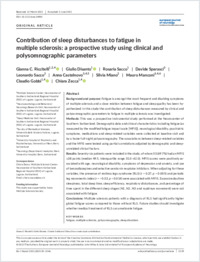Contribution of sleep disturbances to fatigue in multiple sclerosis : a prospective study using clinical and polysomnographic parameters
- Riccitelli, Gianna C. Multiple Sclerosis Center, Neurocenter of Southern Switzerland, Regional Hospital (EOC) of Lugano, Lugano, Switzerland - Neuropsychology and Behavioral Neurology Research Unit, Neurocenter of Southern Switzerland, Regional Hospital (EOC) of Lugano, Lugano, Switzerland - Faculty of Biomedical Sciences, Università della Svizzera italiana, Switzerland
- Disanto, Giulio Multiple Sclerosis Center, Neurocenter of Southern Switzerland, Regional Hospital (EOC) of Lugano, Lugano, Switzerland
- Sacco, Rosaria Multiple Sclerosis Center, Neurocenter of Southern Switzerland, Regional Hospital (EOC) of Lugano, Lugano, Switzerland
- Sparasci, Davide Sleep Medicine Unit, Neurocenter of Southern Switzerland, Regional Hospital (EOC) of Lugano, Lugano, Switzerland
- Sacco, Leonardo Neuropsychology and Behavioral Neurology Research Unit, Neurocenter of Southern Switzerland, Regional Hospital (EOC) of Lugano, Lugano, Switzerland
- Castelnovo, Anna Sleep Medicine Unit, Neurocenter of Southern Switzerland, Regional Hospital (EOC) of Lugano, Lugano, Switzerland - Faculty of Biomedical Sciences, Università della Svizzera italiana, Switzerland - University Hospital of Psychiatry and Psychotherapy, University of Bern, Bern, Switzerland
- Miano, Silvia Neuropsychology and Behavioral Neurology Research Unit, Neurocenter of Southern Switzerland, Regional Hospital (EOC) of Lugano, Lugano, Switzerland
- Manconi, Mauro Sleep Medicine Unit, Neurocenter of Southern Switzerland, Regional Hospital (EOC) of Lugano, Lugano, Switzerland - Faculty of Biomedical Sciences, Università della Svizzera italiana, Switzerland - Neurology Department Inselspital, Bern University Hospital, Bern, Switzerland
- Gobbi, Claudio Multiple Sclerosis Center, Neurocenter of Southern Switzerland, Regional Hospital (EOC) of Lugano, Lugano, Switzerland - Faculty of Biomedical Sciences, Università della Svizzera italiana, Switzerland
- Zecca, Chiara Multiple Sclerosis Center, Neurocenter of Southern Switzerland, Regional Hospital (EOC) of Lugano, Lugano, Switzerland - Faculty of Biomedical Sciences, Università della Svizzera italiana, Switzerland
-
18.06.2021
Published in:
- European journal of neurology. - Wiley. - 2021, vol. 28, no. 9, p. 9
English
Background and purpose: Fatigue is amongst the most frequent and disabling symptoms of multiple sclerosis and a close relation between fatigue and sleep quality has been hypothesized. In this study the contribution of sleep disturbances measured by clinical and polysomnographic parameters to fatigue in multiple sclerosis was investigated. Methods: This was a prospective instrumental study performed at the Neurocenter of Southern Switzerland. Demographic data and clinical characteristics including fatigue (as measured by the modified fatigue impact scale [MFIS]), neurological disability, psychiatric symptoms, medications and sleep-related variables were collected at baseline visit and by a home full-night polysomnography. The associations between sleep-related variables and the MFIS were tested using partial correlations adjusted by demographic and sleep-unrelated clinical factors. Results: Seventy-six patients were included in the study, of whom 53 (69.7%) had an MFIS ≥38 points (median 49.5, interquartile range 31.0– 62.0). MFIS scores were positively associated with age, neurological disability, symptoms of depression and anxiety, and use of benzodiazepines and selective serotonin reuptake inhibitors. When adjusting for these variables, the presence of restless legs syndrome (RLS) (r = 0.37, p = 0.005) and periodic leg movements index (r = −0.33, p = 0.014) were associated with MFIS. Excessive daytime sleepiness, total sleep time, sleep efficiency, respiratory disturbances, and percentage of time spent in the different sleep stages (N1, N2, N3 and rapid eye movement) were not associated with fatigue. Conclusions: Multiple sclerosis patients with a diagnosis of RLS had significantly higher global fatigue scores compared to those without RLS. Future studies should investigate whether medical treatment of RLS can ameliorate fatigue.
- Language
-
- English
- Classification
- Medicine
- License
- Open access status
- hybrid
- Identifiers
-
- RERO DOC 333694
- DOI 10.1111/ene.14984
- ARK ark:/12658/srd1319321
- Persistent URL
- https://n2t.net/ark:/12658/srd1319321
Statistics
Document views: 272
File downloads:
- Texte intégral: 318
